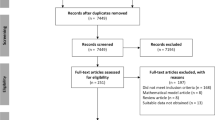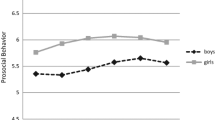Abstract
This study aimed to investigate the effects of the deservingness of envious objects on benign and malicious envy as well as the interaction effect of deservingness and envious type on cooperation in a public goods game (PGG). Participants included 458 children (Mage = 11.31 years, 50% girls) from four public schools in Shanghai, China. Children cooperated with the envied person in deserved and undeserved conditions and then reported their levels of benign and malicious envy. Results showed that undeserved objects triggered more intense benign and malicious envy in children. However, deservingness triggered different types of envious behavioral responses. Younger girls who reported more benign envy were more likely to cooperate in the deserved situation, whereas younger girls and boys who reported more malicious envy were less likely to cooperate in the undeserved situation. The findings highlighted the complex interplay between envy type and children’s age and gender in predicting their cooperation in deserved and undeserved situations.




Similar content being viewed by others
Data availability
The analyzed datasets of the current research are available from the corresponding author on reasonable request.
References
Baumel, A., & Berant, E. (2015). The role of attachment styles in malicious envy. Journal of Research in Personality, 55, 1–9. https://doi.org/10.1016/j.jrp.2014.11.001
Cipriani, M., Giuliano, P., & Jeanne, O. (2013). Like mother like son? Experimental evidence on the transmission of values from parents to children. Journal of Economic Behavior & Organization, 90, 100–111. https://doi.org/10.1016/j.jebo.2013.03.002
Cobo-Reyes, R., & Jiménez, N. (2012). The dark side of friendship: ‘envy.’ Experimental Economics, 15(4), 547–570. https://doi.org/10.1007/s10683-012-9313-0
Cohen-Charash, Y. (2009). Episodic envy. Journal of Applied Social Psychology, 39(9), 2128–2173. https://doi.org/10.1111/j.1559-1816.2009.00519.x
Cohen-Charash, Y., & Larson, E. C. (2017). An emotion divided: Studying envy is better than studying “benign” and “malicious” envy. Current Directions in Psychological Science, 26(2), 174–183. https://doi.org/10.1177/0963721416683667
Croson, R., & Gneezy, U. (2009). Gender differences in preferences. Journal of Economic Literature, 47(2), 448–474. https://doi.org/10.1257/jel.47.2.448
Crusius, J., Lange, J., & Cologne, S. C. C. (2017). How do people respond to threatened social status? Moderators of benign versus malicious envy. Envy at work and in organizations: Research, theory, and applications, 85–110. https://doi.org/10.1093/acprof:oso/9780190228057.003.0004.
Crusius, J., & Lange, J. (2020). Counterfactual thoughts distinguish benign and malicious envy. Emotion. https://doi.org/10.1037/emo0000923
DelPriore, D. J., Hill, S. E., & Buss, D. M. (2012). Envy: Functional specificity and sex-differentiated design features. Personality and Individual Differences, 53(3), 317–322. https://doi.org/10.1016/j.paid.2012.03.029
Duffy, M. K., Scott, K. L., Shaw, J. D., Tepper, B. J., & Aquino, K. (2012). A social context model of envy and social undermining. Academy of Management Journal, 55(3), 643–666. https://doi.org/10.5465/amj.2009.0804
Espinosa, M. P., & Kovářík, J. (2015). Prosocial behavior and gender. Frontiers in Behavioral Neuroscience, 9, 88. https://doi.org/10.3389/fnbeh.2015.00088
Ewoldsen, D. R., Eno, C. A., Okdie, B. M., Velez, J. A., Guadagno, R. E., & DeCoster, J. (2012). Effect of playing violent video games cooperatively or competitively on subsequent cooperative behavior. Cyberpsychology, Behavior, and Social Networking, 15(5), 277–280. https://doi.org/10.1089/cyber.2011.0308
Farh, J. L., Tsui, A. S., Xin, K., & Cheng, B. S. (1998). The influence of relational demography and guanxi: The Chinese case. Organization Science, 9(4), 471–488. https://doi.org/10.1287/orsc.9.4.471
Farh, J. L., Earley, P. C., & Lin, S. C. (1997). Impetus for action: A cultural analysis of justice and organizational citizenship behavior in Chinese society. Administrative Science Quarterly, 421–444. https://doi.org/10.2307/2393733.
Feather, N. T. (1999). Judgments of deservingness: Studies in the psychology of justice and achievement. Personality and Social Psychology Review, 3(2), 86–107. https://doi.org/10.1207/s15327957pspr0302_1
Feather, N. T., & McKee, I. R. (2009). Differentiating emotions in relation to deserved or undeserved outcomes: A retrospective study of real-life events. Cognition and Emotion, 23(5), 955–977. https://doi.org/10.1080/02699930802243378
Feather, N., Wenzel, M., & McKee, I. R. (2013). Integrating multiple perspectives on schadenfreude: The role of deservingness and emotions. Motivation and Emotion, 37(3), 574–585. https://doi.org/10.1007/s11031-012-9331-4
Ferreira, K., & Botelho, D. (2021). (Un) deservingness distinctions impact envy subtypes: Implications for brand attitude and choice. Journal of Business Research, 125, 89–102. https://doi.org/10.1016/j.jbusres.2020.12.008
Gächter, S., Herrmann, B., & Thöni, C. (2010). Culture and cooperation. Philosophical Transactions of the Royal Society b: Biological Sciences, 365(1553), 2651–2661. https://doi.org/10.1098/rstb.2010.0135
Gaviria, E., Quintanilla, L., & Navas, M. J. (2021). Influence of Group Identification on Malicious and Benign Envy: A Cross-Sectional Developmental Study. Frontiers in Psychology, 12, 2353. https://doi.org/10.3389/fpsyg.2021.663735
Gerber, J. P., Wheeler, L., & Suls, J. (2018). A social comparison theory meta-analysis 60+ years on. Psychological Bulletin, 144(2), 177–197. https://doi.org/10.1037/bul0000127
Habimana, E., & Massé, L. (2000). Envy manifestations and personality disorders. European Psychiatry, 15(S1), 15–21. https://doi.org/10.1016/S0924-9338(00)00501-0
Harbaugh, W. T., & Krause, K. (2000). Children’s altruism in public good and dictator experiments. Economic Inquiry, 38(1), 95–109. https://doi.org/10.1111/j.1465-7295.2000.tb00006.x
Heilman, M. E., & Chen, J. J. (2005). Same behavior, different consequences: Reactions to men’s and women’s altruistic citizenship behavior. Journal of Applied Psychology, 90(3), 431–441. https://doi.org/10.1037/0021-9010.90.3.431
Keil, J., Michel, A., Sticca, F., Leipold, K., Klein, A. M., Sierau, S., von Klitzing, K., & White, L. O. (2017). The Pizzagame: A virtual public goods game to assess cooperative behavior in children and adolescents. Behavior Research Methods, 49(4), 1432–1443. https://doi.org/10.3758/s13428-016-0799-9
Khan, A. K., Bell, C. M., & Quratulain, S. (2017). The two faces of envy: Perceived opportunity to perform as a moderator of envy manifestation. Personnel Review, 46(3), 490–511. https://doi.org/10.1108/PR-12-2014-0279
Knight, G. P., & Chao, C. C. (1989). Gender differences in the cooperative, competitive, and individualistic social values of children. Motivation and Emotion, 13, 125–141. https://doi.org/10.1007/BF00992958
Lange, J., & Crusius, J. (2015a). Dispositional envy revisited: Unraveling the motivational dynamics of benign and malicious envy. Personality and Social Psychology Bulletin, 41(2), 284–294. https://doi.org/10.1177/0146167214564959
Lange, J., & Crusius, J. (2015b). The tango of two deadly sins: The social-functional relation of envy and pride. Journal of Personality and Social Psychology, 109(3), 453–472. https://doi.org/10.1037/pspi0000026
Lange, J., Crusius, J., & Hagemeyer, B. (2016). The evil queen’s dilemma: Linking narcissistic admiration and rivalry to benign and malicious envy. European Journal of Personality, 30(2), 168–188. https://doi.org/10.1002/per.2047
Lange, J., Paulhus, D. L., & Crusius, J. (2018). Elucidating the dark side of envy: Distinctive links of benign and malicious envy with dark personalities. Personality and Social Psychology Bulletin, 44(4), 601–614. https://doi.org/10.1177/0146167217746340
Levy, B., Sabato, H., Bereby-Meyer, Y., & Kogut, T. (2021). Who’s more generous than me? Children’s self-evaluation of their prosociality in normative social comparisons. Journal of Experimental Child Psychology, 201, 104996. https://doi.org/10.1016/j.jecp.2020.104996
Malti, T., Gummerum, M., Ongley, S., Chaparro, M., Nola, M., & Bae, N. Y. (2016). “Who is worthy of my generosity?” Recipient characteristics and the development of children’s sharing. International Journal of Behavioral Development, 40(1), 31–40. https://doi.org/10.1177/0165025414567007
Miceli, M., & Castelfranchi, C. (2007). The envious mind. Cognition and Emotion, 21(3), 449–479. https://doi.org/10.1080/02699930600814735
Montal-Rosenberg, R., & Moran, S. (2020). Envy and help giving. Journal of Personality and Social Psychology. https://doi.org/10.1037/pspi0000340
Parks, C. D., Rumble, A. C., & Posey, D. C. (2002). The effects of envy on reciprocation in a social dilemma. Personality and Social Psychology Bulletin, 28(4), 509–520. https://doi.org/10.1177/0146167202287008
Parrott, W. G., & Smith, R. H. (1993). Distinguishing the experiences of envy and jealousy. Journal of Personality and Social Psychology, 64(6), 906–920. https://doi.org/10.1037/0022-3514.64.6.906
Quintanilla, L., & Recio, P. (2019). The effect of deservingness in invidious situations on the intensity of schadenfreude: A developmental study/El efecto del merecimiento sobre la intensidad de schadenfreude en situaciones de envidia: Un estudio evolutivo. Infancia y Aprendizaje, 42(2), 374–412. https://doi.org/10.1080/02103702.2019.1578924
Rand, D. G., & Nowak, M. A. (2013). Human cooperation. Trends in Cognitive Sciences, 17(8), 413–425. https://doi.org/10.1016/j.tics.2013.06.003
Rand, D. G., Dreber, A., Ellingsen, T., Fudenberg, D., & Nowak, M. A. (2009). Positive interactions promote public cooperation. Science, 325(5945), 1272–1275. https://doi.org/10.1126/science.1177418
Rodriguez Mosquera, P. M., Parrott, W. G., & Hurtado de Mendoza, A. (2010). I fear your envy, I rejoice in your coveting: On the ambivalent experience of being envied by others. Journal of Personality and Social Psychology, 99(5), 842–854. https://doi.org/10.1037/a0020965
Salerno, A., Laran, J., & Janiszewski, C. (2019). The bad can be good: When benign and malicious envy motivate goal pursuit. Journal of Consumer Research, 46(2), 388–405. https://doi.org/10.1093/jcr/ucy077
Smith, R. H., & Kim, S. H. (2007). Comprehending envy. Psychological Bulletin, 133(1), 46–64. https://doi.org/10.1037/0033-2909.133.1.46
Steinbeis, N., & Singer, T. (2013). The effects of social comparison on social emotions and behavior during childhood: The ontogeny of envy and Schadenfreude predicts developmental changes in equity-related decisions. Journal of Experimental Child Psychology, 115(1), 198–209. https://doi.org/10.1016/j.jecp.2012.11.009
Sutter, M., Zoller, C., & Glätzle-Rützler, D. (2019). Economic behavior of children and adolescents–A first survey of experimental economics results. European Economic Review, 111, 98–121. https://doi.org/10.1016/j.euroecorev.2018.09.004
Tai, K., Narayanan, J., & McAllister, D. J. (2012). Envy as pain: Rethinking the nature of envy and its implications for employees and organizations. Academy of Management Review, 37(1), 107–129. https://doi.org/10.5465/amr.2009.0484
Tandoc, E. C., Jr., Ferrucci, P., & Duffy, M. (2015). Facebook use, envy, and depression among college students: Is facebooking depressing? Computers in Human Behavior, 43, 139–146. https://doi.org/10.1016/j.chb.2014.10.053
Van de Ven, N. (2016). Envy and its consequences: Why it is useful to distinguish between benign and malicious envy. Social and Personality Psychology Compass, 10(6), 337–349. https://doi.org/10.1111/spc3.12253
Van de Ven, N. (2017). Envy and admiration: Emotion and motivation following upward social comparison. Cognition and Emotion, 31(1), 193–200. https://doi.org/10.1080/02699931.2015.1087972
Van de Ven, N., Zeelenberg, M., & Pieters, R. (2011). Why envy outperforms admiration. Personality and Social Psychology Bulletin, 37(6), 784–795. https://doi.org/10.1177/0146167211400421
Van de Ven, N., Zeelenberg, M., & Pieters, R. (2012). Appraisal patterns of envy and related emotions. Motivation and Emotion, 36(2), 195–204. https://doi.org/10.1007/s11031-011-9235-8
Van Lange, P. A., Joireman, J., Parks, C. D., & Van Dijk, E. (2013). The psychology of social dilemmas: A review. Organizational Behavior and Human Decision Processes, 120(2), 125–141. https://doi.org/10.1016/j.obhdp.2012.11.003
Vogelsang, M., Jensen, K., Kirschner, S., Tennie, C., & Tomasello, M. (2014). Preschoolers are sensitive to free riding in a public goods game. Frontiers in Psychology, 5, 729. https://doi.org/10.3389/fpsyg.2014.00729
Warneken, F. (2018). How children solve the two challenges of cooperation. Annual Review of Psychology, 69, 205–229. https://doi.org/10.1146/annurev-psych-122216-011813
Xiang, Y., & Yuan, R. (2021). Why do people with high dispositional gratitude tend to experience high life satisfaction? A broaden-and-build theory perspective. Journal of Happiness Studies, 22, 2485–2498. https://doi.org/10.1007/s10902-020-00310-z
Yu, Z., Hao, J., & Shi, B. (2018). Dispositional envy inhibits prosocial behavior in adolescents with high self-esteem. Personality and Individual Differences, 122, 127–133. https://doi.org/10.1016/j.paid.2017.10.022
Zeman, J., Cassano, M., Perry-Parrish, C., & Stegall, S. (2006). Emotion regulation in children and adolescents. Journal of Developmental & Behavioral Pediatrics, 27(2), 155–168. https://doi.org/10.1097/00004703-200604000-00014
Acknowledgements
We thank all the participants for their contribution to this project.
Funding
This study was funded by The Research Project of Shanghai Science and Technology Commission (No. 20dz2260300).
Author information
Authors and Affiliations
Corresponding author
Ethics declarations
Ethics Approval
This study was carried out in accordance with the recommendations of the World Medical Association’s Declaration of Helsinki. The protocol was approved by the Research Ethics Review Board at the East China Normal University. Written informed consents were obtained from all participants and their parents.
Conflicts of interest
No potential conflict of interest was reported by the authors.
Additional information
Publisher's Note
Springer Nature remains neutral with regard to jurisdictional claims in published maps and institutional affiliations.
Highlights
The deservingness of others’ advantages influenced the intensity of both benign and malicious envy in children.
We distinguished the different effects of benign envy and malicious envy on cooperation.
Benign envy predicted more cooperation with the envied person in deserved situations in young girls.
Malicious envy predicted less cooperation with the envied person in undeserved situations in young girls and boys.
Supplementary Information
Below is the link to the electronic supplementary material.
Rights and permissions
Springer Nature or its licensor (e.g. a society or other partner) holds exclusive rights to this article under a publishing agreement with the author(s) or other rightsholder(s); author self-archiving of the accepted manuscript version of this article is solely governed by the terms of such publishing agreement and applicable law.
About this article
Cite this article
He, X., Ren, H., Cui, L. et al. Benign and malicious envy and its effects on cooperation in Chinese children. Curr Psychol 43, 16389–16398 (2024). https://doi.org/10.1007/s12144-023-05592-z
Accepted:
Published:
Issue Date:
DOI: https://doi.org/10.1007/s12144-023-05592-z




